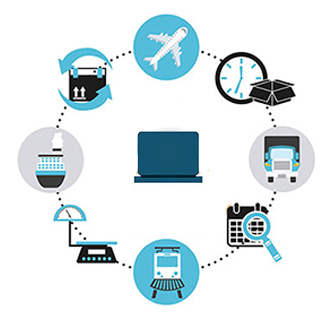Technical innovation keeps on disrupting logistics and supply chain processes by changing it altogether from its core. Subsequently, logistics turn out to be increasingly refined and quick, which changed the way how materials, merchandise, cargo, deals requests, stock, and creation are overseen.
As productivity and speed turned into the deciding components, logistics received another way to deal with manage the rising interest and multifaceted nature of procedures. A practical arrangement that deals with the progression of things so the correct item arrives at the client in the predefined time.
With the help of logistics software, the whole base of logistical activities was smoothed out that removed the problems engaged with the procedure. Organizations that have put resources into logistics management software have created great final products with eye-catching progress in procedure, activities, and conveyance.
In this article, we will have a look at the essential features one needs to know before choosing a logistics management software.
A Checklist of Essentials in an LMS
Before choosing software for logistics management, it is important to understand the requirements and challenges that a business face on a daily basis. Carrying out a detailed analysis can help identify weaknesses in the existing logistical operations of a business. Other than that, it can propose measures to recover any found weakness in the cycle.
When deciding on logistics management software, there are several essential factors to consider. Firstly, it should contain a basic set of functions that can aid in simple logistical management operations.
Besides that numerous other things should also be present in the software to tackle the wide base of logistical operations and processes that each business undertakes. Some of the key features to look for in a potential LMS are:
Software that supports Multiple Clients at a time
A logistics software that comes with multi-client architecture support is necessary if a business handles multiple customers. Software with inventory and purchase orders have more emphasis since the process deals with several customers simultaneously or in different phases.
Estimating the gap between supply and demand
The ability to forecast is a needed trait in a logistics and supply chain management software since it can bridge gaps in supply and demand by enhancing the business processes. Demand, supply, and price forecasting can help supply chain management with proper scheduling of production, improve customer satisfaction, minimizing stocking out of inventory, etc.
Helps in taking care of financial bookkeeping
Having tools that integrate the financial side of the supply chain is another key requirement in the software. Key financial aspects like general ledger, account payables, and receivables, when included in a logistics software can guide manage the bookkeeping and records of transactions conveniently.
Keeping a track of your inventory
Having an inbuilt inventory tracking feature can make a logistics management software more dependable. Since logistics involves transactions of various kinds, inventory control feature enables easier processing while making sure that the customer gets the invoice on time.
Customizable and Smooth Interface
A good logistics management software should contain a streamlined interface that allows for effortless navigation across its chief functions. Customizable logistics software can easily accommodate the unique infrastructure and methods implemented by a business.
Customer Relationship Management
Proper logistics software should also cover the customer side. A CRM installed logistics software allows the customers to know the status of their deliveries. For both inbound and outbound logistics, CRM can answer the queries of the customer and supply them with relevant information along with adjustments to the delivery.
Bill of Lading Creation
As a key document in the shipping and freight chain, it is recommended to look for software that can generate the bill of lading. This can make it easier for creating a bill of lading receipts to facilitate the seamless transaction of goods under the consignee of the shipper and the logistics company.
Conclusion
With logistics pushed to the forefront of business operations, leveraging the right technology can make your business compatible with the changing environment.
Subscription-based IT services like Exxceliq can help you in choosing the right custom logistics solutions solely with your requirements in mind.



One response
[…] this article, we will be talking about the various logistics management software based on the checklist of essentials in logistics management software. So, let’s have a quick look at these […]